- Home
- Jason Webster
A Death in Valencia
A Death in Valencia Read online
The author and publisher have provided this e-book to you for your personal use only. You may not make this e-book publicly available in any way. Copyright infringement is against the law. If you believe the copy of this e-book you are reading infringes on the author’s copyright, please notify the publisher at: us.macmillanusa.com/piracy.
For Ollie, Nikki, Lena and Maddie
y en memoria de Javier Botella
Contents
Chapter One
Chapter Two
Chapter Three
Chapter Four
Chapter Five
Chapter Six
Chapter Seven
Chapter Eight
Chapter Nine
Chapter Ten
Chapter Eleven
Chapter Twelve
Chapter Thirteen
Chapter Fourteen
Chapter Fifteen
Chapter Sixteen
Chapter Seventeen
Chapter Eighteen
Chapter Nineteen
Chapter Twenty
Chapter Twenty-One
Chapter Twenty-Two
Chapter Twenty-Three
Chapter Twenty-Four
Chapter Twenty-Five
Chapter Twenty-Six
Chapter Twenty-Seven
Chapter Twenty-Eight
Chapter Twenty-Nine
Chapter Thirty
Chapter Thirty-One
Chapter Thirty-Two
Chapter Thirty-Three
Acknowledgements
You are a little soul, carrying a corpse.
Epictetus
Note
There are several police forces in Spain. Chief Inspector Max Cámara works for the Cuerpo Nacional de Policía, or Policía Nacional, which deals with major crimes in the larger towns and cities. The Guardia Civil is largely a rural police force, or gendarmerie, covering the countryside and smaller towns and villages, although it also carries out border duties and sea patrols, takes part in operations abroad, and has city-based headquarters. Both the Policía Nacional and Guardia Civil report to the Interior Ministry, although the Guardia Civil is paramilitary and has links with the Defence Ministry.
In addition to these national forces, towns and cities tend to have a local police force–the Policía Local, also known as the Policía Municipal. This deals with smaller crimes, official engagements and traffic duties, and is under the control of each respective Town Hall. A member of the Policía Local may sometimes be referred to as a ‘Municipal’.
One
Sunday 5th July
The green-and-white Guardia Civil patrol boat looked out of place so close to the shoreline. Its sharp-cut lines and metallic sheen spoke of thrust and speed in a place where people sought the softening embrace of sand, the gentle peal of waves and the caress of the sun. Sitting there motionless, an invasive presence, it was unclear what was causing the greater disturbance: its own arrival, or what it had come for.
A couple of Policías Nacionales from the squad car accompanied him as he found an alleyway cutting through the row of cafés and paella restaurants and headed towards the beach. Along the promenade a few heads turned towards the sea trying to make out what was going on, but the terraces were filled mostly with early-evening drinkers, children eating ice cream, and overheated waitresses carrying heavy, laden trays through a tide of discarded straws and paper serviettes. Above their heads, palm trees arched into the humid blue sky, while yellow-and-white flags from the lamp posts rippled as they caught an unlikely breeze.
Ignoring the main entrance to the beach a few yards away, he skipped over the low wall and on to the sand. The presence of uniformed policemen among the bystanders seemed to confirm to most that whatever was going on was serious, and needed to be witnessed. Yet already different types were discernible, like competing currents of water: those moving away, not wanting to see; others flowing in. From underneath their mirror sunglasses, he saw the eyes of the officers with him darting over the array of exposed flesh as they grimly maintained their expressions of serious business-at-hand. He, too, was conscious of rounded forms, of browning skin and wet black hair streaking over naked shoulders. But there was only ever one body for him.
A second group of Policías Nacionales was standing on the shoreline. He felt sand seeping into his shoes as the officer in charge saluted and held out a hand to shake.
‘Been there at least half an hour,’ he said, nodding in the direction of the Guardia Civil boat.
On the deck, he could make out the captain standing with his legs wide apart, a green cap on his head and his eyes shaded by the black binoculars he was holding up with both hands. They were so close that the two groups of law officers could almost talk to one another without needing to shout, but he knew that so far there had been no communication. A stand-off. Whoever was first to breach the silence would later get the paperwork load describing every step of protocol, every detail of what happened next.
And all the responsibility if things went wrong.
The police officer handed him a pair of binoculars, the same Interior Ministry standard issue that was being trained on him at that moment. He’d already seen the body as he’d walked over the wide expanse of the beach, already sensed in his guts who it was, but nonetheless he focused the glasses on the floating, bloated form as it lay still in the tranquil Mediterranean waters, exactly halfway between the Guardia Civil boat and the Policía Nacional officers lining the shore, with a thousand sunbathers at their backs.
Half an hour, and still no one had made a move. The Guardia Civil captain would be wondering what would happen now that this more senior policeman had showed up. He’d be weighing him up, concluding, quite correctly, that being out of uniform he was a Judicial, an investigating cop. And from the way the others in his group deferred to him, he was almost certainly an inspector, perhaps even chief inspector, although on the young side. Still, superior enough to make a call on this, to break the impasse.
So whose was it? A body out at sea was Guardia Civil property. On land, here in the city, a stiff belonged to the Nacionales. And this one just couldn’t decide which way it wanted to go. Caught between earth and water, floating in a legal grey area in the unmoving, shimmering blue. He glanced down at his feet: other detritus from the Mediterranean appeared to have less of a problem finding its way ashore. The usual collection of driftwood, scraps of plastic, seaweed and used contraceptives had found refuge on the pale brown sand, discarded rubbish and waste from the ships in the port just a few metres away.
He trained the binoculars again on the body. A light westerly poniente breeze was blowing across from the plains and flattening the sea, which stretched out ahead like a sheet of glass. No waves, no currents to push the body in either one direction or the other.
For a moment he became aware of the crowds behind them. There were the usual groups for a weekend in early July: couples, families, professional sunbathers, elderly men with their lives in plastic carrier bags and nowhere else to go, teenagers still feeling their way around their changing bodies, students pretending to revise for the September retakes. He saw that a large number of them had yellow-and-white rucksacks, the same colours as the flags further back: free gifts from the Church preparing for the Pope’s visit later in the week to head the World Families Conference.
There was another sound, though, another group among all these: the sound of light giggling mixed in with the occasional cry. There were children on this beach, dozens of them. Some with their parents, others in a small group from the El Cabanyal district just behind them. For half an hour police officers had been standing here watching a dead body breaking the surface while kids were still splashing in the water only yards away.
He took one last look
at the floater, then up at the Guardia Civil captain, a rage willing itself into life inside him. Strictly, this was a Guardia Civil job. The man should have sent a dinghy out there and pulled the body back out to the boat. But something about his posture, something about his appearance, made Cámara relent. There was a look about him he had seen before, something he’d caught sight of in his colleagues, and in himself on occasion, something that, at times at least, seemed to be growing more frequent: the frozen, almost death-like expression that came when real decisions had to be made, and responsibility taken. This wasn’t bloody-mindedness on the captain’s part, it was inertia brought on by the bureaucratic labyrinth he could see himself getting caught in if he took just one step.
Handing the binoculars back to the officer at his side, he slipped off his shoes and pulled the belt from around his waistband, folding his jacket and laying it on the sand.
‘I’m going in,’ he said. ‘Send two others to come with me.’
A foreign backpacking couple were sitting up and watching from nearby. He walked over to them and through sign language and a few words of English, made them understand he wanted some toothpaste. Reluctantly, a white tube was handed over; Cámara checked the writing on the side, then slapped a thick amount just under his nose to create a protruding blue Hitler moustache. After ordering the two officers volunteered for the job to do the same, he gave the tube back to the bemused tourists.
Bodies fished from water stank. Most people simply couldn’t cope with the putrid, rotten stench. Those with strong stomachs only managed to do so by disguising it with the one thing that worked: menthol.
By the time they’d reached the body and brought it closer to the shore, a first group of crime scene officers from the Policía Científica had arrived and were putting up screens to form an area of relative privacy. Meanwhile, the uniformed officers were moving people on, trying to empty the beach as best they could. Cámara and the two volunteers waited in the water for a couple of minutes for plastic sheets to be laid on the sand before finally the order was given for the body to be hauled out. As soon as it was clear what was happening, the Guardia Civil boat powered away in a white arc, heading towards the port.
Confirmation would come later, but it was already clear who they’d found, despite the effects of being in warm seawater for over a week. Pep Roures’s distinctive ginger hair looked brighter than usual against the green-black marbling of his skin. Any doubt that it wasn’t the fifty-year-old had been removed in Cámara’s own mind by the sight of the tattoo still visible on the corpse’s left shoulder: a paella dish, complete with green beans and bright yellow rice. Few artists, he imagined, were asked to scratch out one of those.
He stood to one side for a moment, feeling the salt water dry on his skin as he tried to forget the stench of decay that seemed to have penetrated his brain. First the científicos, then the médico forense and the investigating judge and his team from the City of Justice, would be showing up. The usual circus surrounding the dead–at least while they still mattered to people. Then they would all be gone and he’d be left alone.
With his murder.
His before the body had even been spotted here off the Malvarrosa beach. Pep Roures had disappeared from his home and restaurant in El Cabanyal seven days before, and from the start Cámara had known it was more than a simple missing persons case. Something about the man, something about what he’d seen of his place, told him Roures had never intended to vanish. Besides, La Mar was his life. They all knew him, they’d all eaten there at some point. The restaurant was virtually an institution among Valencians. Or a certain kind of Valencian. Where would Roures go to? No one had seen him. No one really knew if he had anywhere else to go. He was dead. An accident? Perhaps. They’d just needed to find the body.
Back up at the promenade, he spotted a green uniform breaking through the dark blue line of the Nacionales. The face was almost familiar now. Rubbing his hand through his hair a last time to shake off the water, and wiping the remains of the toothpaste from his top lip, he strode barefoot and shirtless over the sand. Others might have waited, let the bastard come all the way, but they’d be better off speaking out of earshot of their respective colleagues.
The Guardia Civil captain stopped a few yards short and saluted.
‘Captain Herrero, of the Servicio Marítimo,’ he said sharply.
‘Cámara. Homicidios.’ There was a pause while the other man waited for him to fill in the missing information. ‘Er, chief inspector.’
Cámara held out a hand to shake before the captain could begin his prepared spiel excusing himself over what had happened.
‘It’s ours,’ Cámara said as he sniffed at the salt water dripping from the end of his nose. ‘I know the guy. Went missing a while back. I was already looking into it.’
Captain Herrero stood motionless, his brow glistening in the heat trapped under his cap. He was taller than Cámara, with a sinewy strength in his limbs. Late twenties, perhaps early thirties. Still young enough to care.
‘He was practically on the beach already.’
‘What’s that?’ Herrero said, seeming to come to life of a sudden.
‘I said it’s ours. You won’t be hearing from me. Or from anyone in Homicidios.’
The captain let out a sigh.
‘Half our lot are off sick,’ he said, shaking his head. ‘Depression. Can’t cope with the new hours they’ve given us. Arse of a new general has come in changing all our rotas. Estamos jodidos.’ We’re fucked.
Cámara forced a sympathetic smile.
‘We’re not even treading water with the drug runs along the coast. The last thing we needed was—’
‘It’s OK,’ Cámara said. ‘Really. If you can fix things at your end, no one’s going to hear from us about you spotting the body. Understood?’
Herrero looked him in the eye. Yes, something told him he could trust this half-naked police chief inspector.
‘I owe you one.’
‘Forget it,’ Cámara said. ‘Besides, el muerto es del mar cuando la tierra lejos está.’
‘¿Qué?’
‘One of my grandfather’s old proverbs: A dead man only belongs to the sea if land is far away.’
Two
The entrance-hall light was still on when he got back to his block of flats in Ruzafa, and he found his downstairs neighbour, Susana, struggling with a buggy as her one-year-old did his best to scatter toys over the stairs.
‘Here, let me help.’
‘Could you just grab Tomás for me?’ she said with a sigh. ‘He’s in an exploring phase at the moment. Boxes, cupboards, bags–he absolutely has to know what’s inside them all.’
Cámara leaned down to pick the baby up.
‘Come on, chiquitín.’
Tomás gave a whine as he was dragged away from his brightly coloured plastic keys, then stared up into Cámara’s face and giggled.
‘You’re growing pretty fast.’ Cámara stroked his head. ‘And a nice crop of hair growing up here as well, I can see. Unlike some of us.’
Susana smiled as she picked up the buggy and started climbing the stairs.
‘I’m glad we’re only on the first floor,’ she said. ‘I can’t imagine having to carry him all the way to the top every day.’
‘There was talk of putting in a lift once,’ Cámara said. ‘Years back. But the landlady refuses to spend any money on the place.’ He shrugged.
Tomás had rested his head on Cámara’s shoulder and was now chewing at his neck.
‘He’s teething,’ Susana said. ‘I’m sorry. Probably kept you awake last night with his crying.’
‘Didn’t hear a thing. I’m a heavy sleeper.’
Susana placed the buggy down in front of her door.
‘Here, let me take him.’
Tomás allowed himself to be prised away and slid into his mother’s grip.
‘I’ll just run down and get your bags,’ Cámara said.
‘Oh, really. I can get them la
ter.’
But he was already halfway down the stairs.
‘So, you ready for His Holiness coming next week?’ she said with a raised eyebrow as he returned. ‘They’re talking about a million people descending on the city.’
‘I’d happily leave town,’ Cámara said. ‘But they’ve cancelled all leave. Security. Just in case someone takes a potshot at him, or something.’
‘I bet there are plenty in this city that wouldn’t mind having a try.’
‘Yeah, that’s why I’d like to get out. Resist the temptation.’
It was only when she giggled that she really looked as young as she was. Having a baby, and then being left to look after it on her own, seemed to have put extra years on her. But laughter exposed the twenty-five-year-old she actually was. She’d moved in just a few months before giving birth to Tomás. Cámara had only bumped into the father a couple of times before he’d vanished.
‘Have you seen the flag Esperanza’s hung from her balcony?’
Cámara rolled his eyes.
‘No, I haven’t. Let me guess, another Vatican banner?’
‘You’d kind of expect it from her, I suppose. Someone of her age. But they’re everywhere. I never knew we were surrounded by so many fans of the Pope. It’s like they’re all coming out of the woodwork, or something.’
They heard the click of the main door in the hall beneath them, and stopped talking. Looking over the staircase railings, Cámara spotted the shape of a young man in an orange T-shirt.

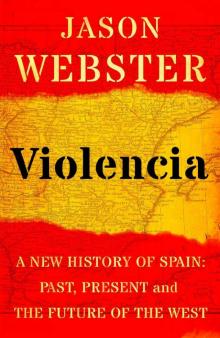 Violencia
Violencia Or the Bull Kills You
Or the Bull Kills You The Killing of El Niño Jesús
The Killing of El Niño Jesús The Spy with 29 Names
The Spy with 29 Names Duende
Duende Guerra
Guerra Sacred Sierra
Sacred Sierra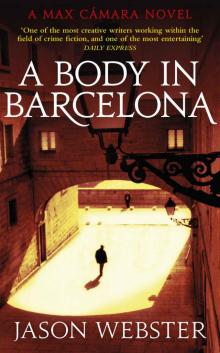 A Body in Barcelona: Max Cámara 5
A Body in Barcelona: Max Cámara 5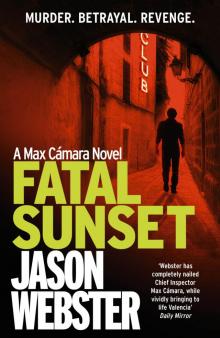 Fatal Sunset
Fatal Sunset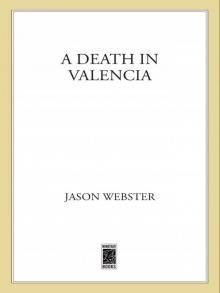 A Death in Valencia
A Death in Valencia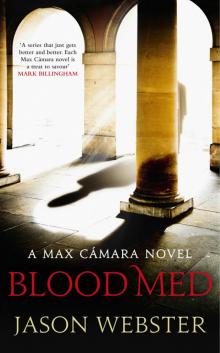 Blood Med
Blood Med Andalus
Andalus